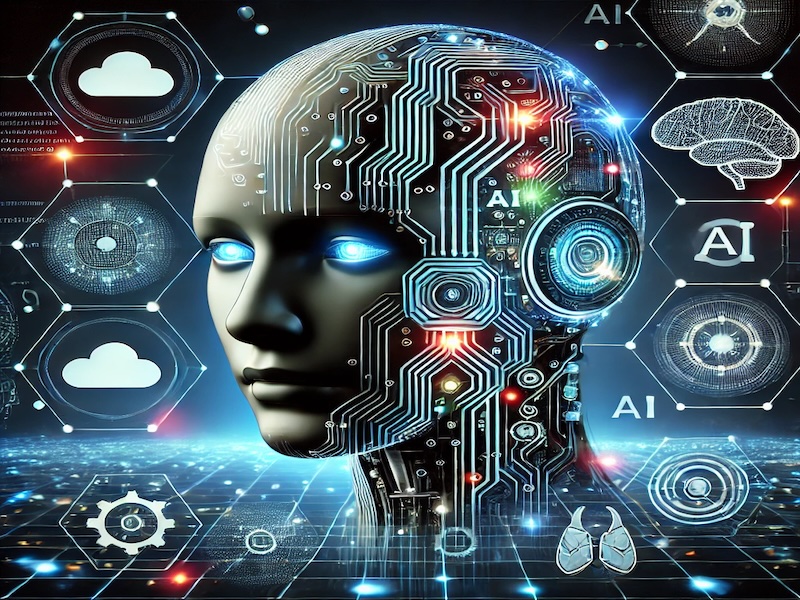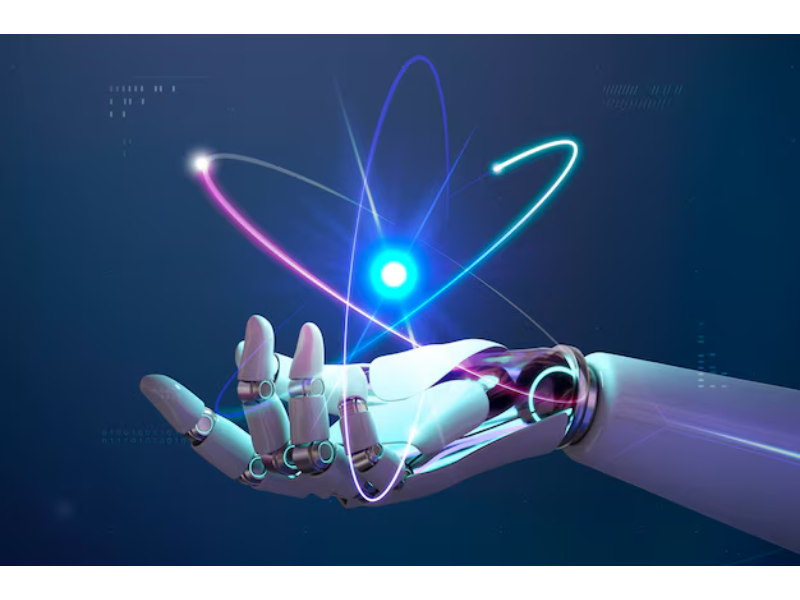- General AI refers to artificial intelligence that mimics human-like reasoning across various tasks, unlike narrow AI, which is designed for specific tasks.
- Although general AI holds immense potential, there are significant technological and ethical challenges to overcome before it can become a reality.
Artificial intelligence (AI) has become a pivotal force in today’s technological landscape, with applications ranging from healthcare to finance. But as AI continues to evolve, it’s the concept of general AI that’s stirring the most interest. Unlike narrow AI, which is designed to perform specific tasks, general AI aims to possess the cognitive capabilities of humans, able to reason, learn, and adapt across a variety of domains.
So, what is general AI, and why is it considered the next big step in AI development? In this article, we will explore how general AI is distinguished from other forms of AI, its potential benefits, and the challenges that lie in developing it.
Also read: What is narrow AI?
Also read: Public Cloud and Generative AI boost data security needs
- Defining general AI vs. narrow AI
- Challenges in achieving general AI
- Real-world applications of general AI
- Related technologies enabling general AI
- The debate: Risks and rewards of general AI
- How general AI is different from human intelligence
- The potential and challenges of General AI
- The future of general AI
- FAQs: What is general AI? Understanding the next evolution in AI
Defining general AI vs. narrow AI
When discussing AI, it’s essential to understand the difference between narrow and general AI. Narrow AI refers to systems designed to perform specific tasks, such as facial recognition, language translation, or recommendation algorithms. These systems excel at the task they are programmed for but lack the ability to handle anything outside of their specific purpose. For example, while Google’s AI can excel at search algorithms, it can’t perform tasks like driving a car or diagnosing diseases without further programming.
In contrast, general AI (or AGI – artificial general intelligence) refers to machines that have the potential to perform any intellectual task that a human can. These systems would not be restricted to a narrow set of applications; they could theoretically perform diverse tasks, learn from experiences, and apply knowledge across multiple domains.
Unlike narrow AI, general AI would exhibit versatility and adaptiveness, learning to deal with new and unforeseen challenges.

Challenges in achieving general AI
Developing General AI poses significant technical, ethical, and philosophical challenges. Unlike specialized AI, AGI needs a holistic understanding of the world. Here are some hurdles researchers face:
1. Computational Complexity
Simulating human-level intelligence requires immense computational power. Current algorithms struggle with scalability, and hardware limitations exacerbate the problem.
2. Understanding Consciousness
To achieve AGI, developers must grapple with defining and replicating consciousness—a concept philosophers and scientists have debated for centuries.
3. Ethical Implications
The advent of General AI raises profound ethical questions. For instance, how do we ensure AGI aligns with human values and does not pose unintended risks?
Also read: MediaTek launches Dimensity 8400 5G chipset with GenAI features
Also read: Nvidia’s AI dominance challenged by AMD and Custom Silicon

Real-world applications of general AI
While true AGI remains theoretical, its potential applications are staggering. Some areas where General AI could transform industries include:
1. Healthcare
General AI could revolutionize medicine by providing personalized diagnoses and treatments, simulating complex surgeries, or even accelerating drug discovery.
2. Education
An AGI-powered tutor could adapt to individual learning styles, helping students overcome their unique challenges and improving global education outcomes.
3. Space Exploration
AGI could play a pivotal role in deep-space missions, making autonomous decisions in environments where human intervention is impossible.
Also read: The path to achieving general AI

Related technologies enabling general AI
1. Neural Networks
Deep learning models, particularly neural networks, are essential for AGI development. These networks mimic human brain structures, enabling machines to process and analyze complex information.
2. Natural Language Processing (NLP)
Advances in NLP have brought us closer to AGI by enabling machines to understand and generate human language more naturally.
3. Reinforcement Learning
This technique allows machines to learn by interacting with their environment, making it a cornerstone of AGI research.
Artificial intelligence is the new electricity. Just as electricity transformed industries 100 years ago, AI will now transform every industry.
Andrew Ng, Co-founder of Google Brain and Coursera
The debate: Risks and rewards of general AI
1. Potential Risks
Critics argue that AGI could lead to existential risks if it surpasses human control. Scenarios such as rogue AI systems or widespread unemployment due to automation have fueled public concern.
2. Unprecedented Benefits
On the flip side, AGI could unlock unprecedented technological advancements. From solving climate change to eradicating diseases, the possibilities are limitless.
Striking the Balance
The key to harnessing AGI’s potential lies in responsible development and robust governance frameworks.
Also read: General AI and creativity: Can machines truly be creative?
How general AI is different from human intelligence
While general AI is designed to mimic human intelligence, it differs from human cognition in significant ways. Human intelligence is highly flexible, learning from a variety of experiences and adapting to new environments. It is influenced by emotions, context, and social dynamics, making it deeply personal and context-dependent. General AI, on the other hand, aims to replicate this versatility in a machine but still relies on algorithms and massive datasets to learn and adapt.
The challenge is that, unlike humans who can learn intuitively and contextually, AI systems require vast amounts of structured data to operate effectively. While we humans can make educated guesses or creative leaps without much information, AI depends on data to draw conclusions. This presents a fundamental challenge in creating general AI—developing a system that can think, reason, and learn in ways that are flexible and intuitive, similar to how a human brain works.

The potential and challenges of General AI
The potential of general AI is immense. If achieved, it could revolutionise industries across the board, from medicine to education, by offering solutions to complex problems that would take humans decades to solve. For example, general AI could potentially accelerate drug discovery, automate research in various fields, and make data-driven decisions in real time, improving efficiency and productivity.
However, the road to achieving general AI is not without its challenges. One of the major hurdles is ensuring that such an advanced system can understand context, reason logically, and apply knowledge creatively—similar to how humans approach problem-solving. Current AI models, while powerful, still struggle with generalising knowledge across different domains. Another significant challenge is the ethical implications of creating a machine with human-like intelligence. Questions about control, decision-making, and accountability arise, particularly if such AI systems were given autonomy in high-stakes environments.
Also read: The benefits of AI technology
The question is not whether intelligent machines can have any emotions, but whether machines can be intelligent without any emotions.
Marvin Minsky, AI Pioneer and Cognitive Scientist
The future of general AI
General AI represents an exciting yet daunting evolution in artificial intelligence. Its development promises to redefine human-machine collaboration, unlocking new potentials for solving complex global challenges in areas like healthcare, education, climate change, and beyond. For instance, an AGI could design new medical treatments, predict climate patterns with unprecedented accuracy, or even generate novel solutions to some of humanity’s most pressing issues. However, with such immense power comes significant responsibility. As AGI moves from concept to reality, it is crucial that we foster open dialogue between technologists, policymakers, and ethicists to ensure that these systems are developed responsibly and aligned with human values.
Prioritizing ethical considerations, such as transparency, accountability, and fairness, will be essential in avoiding unintended consequences that could arise from autonomous decision-making systems. Investment in responsible AI research must become a global priority, ensuring that safety mechanisms, regulations, and oversight structures are in place to manage any risks associated with AGI.
By understanding the immense potential and the possible pitfalls of General AI, society can better prepare for its inevitable integration into everyday life. The journey toward AGI is not merely about advancing technology—it is about navigating the complex relationship between humanity and intelligent machines, ensuring that AGI serves humanity’s collective best interests for generations to come.
FAQs: What is general AI? Understanding the next evolution in AI
General AI (AGI) refers to artificial intelligence that has the ability to understand, learn, and perform any intellectual task that a human can do. It can adapt its knowledge across various domains. Narrow AI, on the other hand, is designed to handle specific tasks like facial recognition, voice assistants, or game-playing, and is highly specialized in one area but lacks the versatility of AGI.
While General AI has made significant strides in theory and some practical aspects of research, we are still far from achieving AGI. Experts in the field are divided on timelines, with estimates ranging from a few decades to over a century. Developing AGI requires breakthroughs in computational power, learning algorithms, and ethical frameworks, making it a challenging goal to reach.
One of the major concerns with General AI is the risk of losing control over machines that surpass human intelligence. Potential risks include:
Autonomous systems making decisions that may harm humanity.
AGI systems becoming unaligned with human values, leading to unintended consequences.
Widespread job displacement due to the automation of tasks traditionally performed by humans.
Several advanced technologies contribute to the development of General AI:
Neural Networks: Deep learning models that mimic human brain structures and help process vast amounts of data.
Natural Language Processing (NLP): A field of AI that enables machines to understand, generate, and interact using human language.
Reinforcement Learning: A learning technique where machines interact with their environment and learn by trial and error, improving over time.
These technologies play essential roles in enabling machines to handle tasks as broadly as a human would.
General AI has the potential to revolutionize many industries by automating complex tasks, leading to greater efficiency and innovation. In healthcare, education, and even creative fields, AGI could provide personalized solutions that drastically improve outcomes. However, widespread automation may also result in job displacement, requiring society to adapt by re-skilling workers and ensuring equitable access to the benefits of AGI. Balancing technological advancement with ethical responsibility will be key to its positive impact on society.

